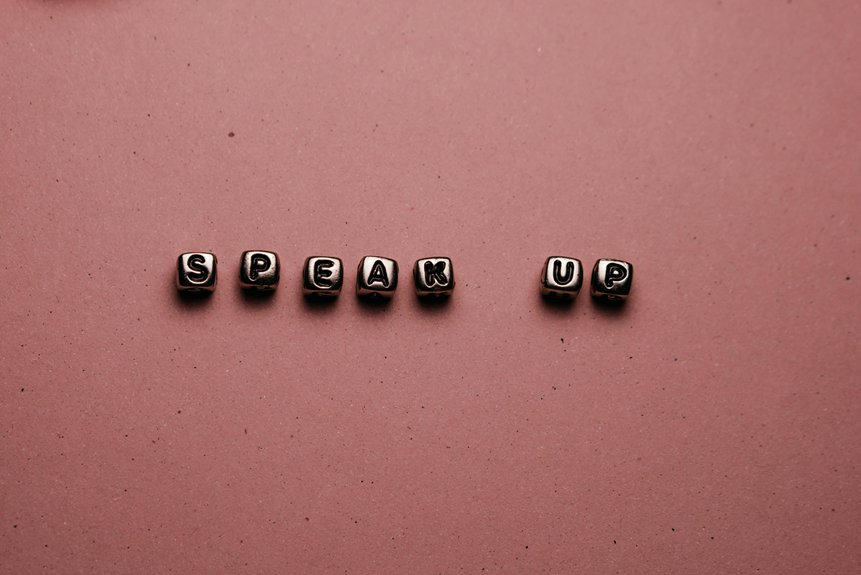Ever notice those people who breeze through life making it look *annoyingly* easy? They’re not superhuman – they just never apologize for existing.
These folks have mastered the art of confident communication without being jerks about it. They say no without drowning in guilt. They own their achievements without shrinking. They stand by their opinions without wavering.
The words you choose shape how the world responds to you. Want more respect? Start by ditching those unnecessary “sorrys” that are probably peppered throughout your daily conversations.
It’s that simple. Not easy, but simple. Your voice matters – might as well use it like you mean it.
Key Takeaways
- Confident people decline requests directly by stating unavailability and suggesting alternatives without lengthy justifications or apologies.
- They express disagreement respectfully with clear reasoning, focusing on the issue rather than making personal attacks.
- Confident individuals acknowledge personal achievements and take credit for their work without downplaying their contributions.
- They ask questions and seek clarification when needed, viewing it as a strength rather than a weakness.
- They maintain clear boundaries by directly communicating their needs and expectations without feeling obligated to justify themselves.
I’m not available at that time, let’s reschedule.
When you need to decline a meeting time, “I’m not available at that time, let’s reschedule” is straightforward gold. Notice how it doesn’t include a lengthy explanation or an apology for your schedule constraints. Confident communicators simply state their unavailability as fact, then immediately offer a solution-focused alternative.
This approach acknowledges your time boundaries while showing respect for the relationship by suggesting continuation.
The beauty of this phrase is how it eliminates the impulse many of us feel to justify our unavailability. You don’t need to share that you’re picking up your kids, attending another meeting, or honestly just need some quiet time to focus.
Your calendar belongs to you, and managing it decisively shows self-respect. When you drop the apologetic tone and unnecessary details, you communicate that having boundaries is normal, expected, and completely acceptable. Avoiding excessive explanations helps you steer clear of false confidence signals that often manifest through over-justification.
I don’t agree with that approach, here’s why.
Expressing disagreement confidently marks another critical difference between uncertain communicators and those who speak with conviction. “I don’t agree with that approach, here’s why” signals your intellectual independence without diminishing others or seeming combative, while also establishing your position as a thoughtful contributor who has carefully considered the matter at hand rather than simply reacting emotionally.
When you disagree respectfully while clearly outlining reasoning, you demonstrate both confidence and consideration. It’s like telling the truth without being a jerk about it.
| Confident Disagreement | Uncertain Disagreement |
|---|---|
| “I see it differently because…” + specific evidence | “Sorry, but maybe possibly…” + vague concerns |
| “My experience suggests…” + concrete examples | “I could be wrong, but…” + hesitant qualifiers |
| “Here’s my perspective…” + logical framework | “I’m probably missing something…” + self-doubt |
| “Research indicates…” + data references | “I’m not sure if…” + incomplete thoughts |
| “Let me offer an alternative view…” + solutions | “Don’t quote me on this…” + deflection |
Don’t water down your viewpoint with unnecessary apologies. Your thoughtful dissent often contributes more value than mindless agreement ever could.
Professional discourse thrives on well-reasoned disagreement that advances understanding through careful consideration of multiple perspectives. The key lies in maintaining a balance between assertiveness and respect, ensuring that your contrary viewpoint is presented with both the confidence of thorough preparation and the humility to acknowledge the validity of other experiences or interpretations.
Learning to navigate awkward moments with poise requires practicing these communication techniques regularly.
I’ve changed my mind after considering new facts.
Changing your mind based on new information isn’t a weakness—it’s a sign of intellectual strength. Confident people don’t cling to outdated positions just to save face. Instead, they say things like, “After reviewing these studies, I’ve changed my perspective,” or “I used to believe that, but new evidence has convinced me otherwise.”
They acknowledge their previous stance directly and pivot without shame or excessive explanations, because growth requires flexibility. This ability to evolve your thinking shows both security and wisdom.
The most respected leaders and thinkers throughout history have altered their views when presented with compelling information. When you straightforwardly announce your shifted perspective, you demonstrate that you value truth over ego and learning over looking perfect.
People actually trust you more, not less, when you can confidently acknowledge that your understanding has developed—just state the change clearly and move forward.
Unlike people pleasers, confident individuals aren’t afraid to revise their positions for fear of disappointing others.
That doesn’t work for me, let’s find another way.
Confident communication isn’t about bending to others’ wishes at the expense of your own wellbeing and values. When something doesn’t align with your needs or values, it’s perfectly acceptable to say, “That doesn’t work for me, let’s find another way,” which demonstrates both self-respect and a commitment to finding mutual solutions. This approach allows you to maintain your boundaries while showing respect for others’ perspectives, creating space for collaborative problem-solving rather than conflict or resentment. Setting clear boundaries and expressing your needs directly helps build stronger, more authentic relationships based on mutual understanding and respect. Confident people understand that apologizing when setting boundaries undermines their self-worth and authority.
| Instead of Saying… | Try This Instead… | Why It’s More Effective |
|---|---|---|
| “I guess so…” | “I need something different that aligns with my goals” | Shows clarity and purpose while maintaining respect |
| “Whatever you want” | “Let’s investigate alternatives that benefit everyone” | Demonstrates engagement and collaborative spirit |
| “Sorry, but I can’t” | “I’m looking for another approach that addresses our needs” | Shifts focus from negative to positive solutions |
| “Maybe next time” | “Let’s try collaborative strategies to find common ground” | Opens door for immediate problem-solving |
| “I’ll just deal with it” | “How can we make this work for everyone involved?” | Promotes active participation and shared responsibility |
Effective communication requires both assertiveness and empathy to create meaningful dialogue and lasting solutions. The key is to express your thoughts and needs clearly while remaining open to others’ perspectives and ideas, fostering an environment of mutual respect and understanding. This balanced approach helps build stronger professional relationships and personal connections while ensuring your own needs are met, leading to more satisfying and productive interactions for all parties involved.
I deserve credit for the work I contributed.
Downplaying your contributions doesn’t serve anyone and actually creates confusion about who did what.
People respect clarity, and your colleagues need to know where credit belongs—both for proper attribution and for understanding team dynamics.
Remember, owning your accomplishments doesn’t take away from others’ work; it actually creates a culture where everyone’s contributions are recognized.
Next time you’re tempted to dismiss your work, pause and practice saying, “Thank you, I worked hard on that” instead of apologizing for shining.
Developing natural confidence habits helps you stand authentically in your power and attract more opportunities.
I’m not comfortable with that request or tone.
When someone makes an inappropriate request or speaks to you disrespectfully, you have every right to address it without apologizing for your boundaries. Assertive communication involves standing firm in your position while remaining professional and composed. Confident people understand that setting clear boundaries is essential for maintaining healthy relationships and self-respect. They recognize that apologizing for having standards or limits undermines their personal authority and sends the wrong message.
Internal validation comes naturally to those who trust their judgment and capabilities.
| Instead of saying… | Try saying… |
|---|---|
| “Sorry, but I can’t do that.” | “I’m not comfortable with that request and won’t be proceeding.” |
| “I’m sorry you feel that way.” | “I don’t appreciate that tone and expect respectful communication.” |
| “Sorry to interrupt, but…” | “I need to address something directly at this moment.” |
| “Sorry if this sounds rude…” | “To be clear about my boundaries and expectations…” |
| “Sorry that won’t work for me.” | “That doesn’t align with my boundaries or schedule.” |
| “Sorry, I disagree.” | “I have a different perspective on this matter.” |
| “Sorry for the confusion.” | “Let me clarify my position.” |
Setting boundaries is a fundamental skill that requires practice and consistency to master effectively. Learning to communicate your limits without apologizing helps build self-respect and teaches others how to treat you appropriately. This approach not only strengthens your personal relationships but also enhances your professional presence and leadership capabilities. Regular practice of unapologetic boundary-setting leads to improved confidence and more authentic interactions in all areas of life.
I value my time and won’t overextend myself.
When you understand what you can realistically handle in your day, you’ve discovered a superpower most people never develop. Confident people aren’t afraid to say, “I’ve reached my limit,” or “That doesn’t fit my schedule right now.” They recognize their time is a finite resource—not an endless well others can drain.
Instead of nervously agreeing to every request that comes their way, they assess what they can reasonably accomplish without burning themselves out.
This boundary-setting isn’t selfish; it’s actually a mark of self-respect and honesty. By acknowledging your limits, you communicate more authentically with others and deliver higher quality work on what you do commit to.
When you decline additional responsibilities without apologizing for having reasonable limits, you demonstrate that you value yourself enough to protect your energy, attention, and well-being. The truth is, most people respect someone who knows their boundaries more than someone who constantly overcommits and underdelivers.
Developing daily confidence habits helps reinforce your ability to protect your time and maintain healthy boundaries.
I’ll need more context before making a decision.
Instead of rushing to judgment with incomplete information, confident people comfortably pause the conversation and say, “I’ll need more context before making a decision.” This demonstrates intellectual maturity and shows a deep understanding that complex situations rarely have simple solutions. This isn’t hedging or indecisiveness—it’s intellectual honesty at its finest and reflects a commitment to making well-informed choices. You’re actually demonstrating strength when you prioritize thorough information gathering over hasty conclusions, as this approach leads to better outcomes and builds trust with others. Making gradual choice decisions helps build lasting confidence through intentional practice.
| When You Need More Context | Why It’s Powerful |
|---|---|
| Complex work decisions | Prevents costly mistakes, improves team alignment, and ensures strategic fit |
| Personal commitments | Protects your boundaries, maintains work-life balance, and prevents overextension |
| Major purchases | Saves money and regret, enables comparison shopping, ensures long-term value |
| Relationship conflicts | Shows respect and fairness, promotes mutual understanding, creates space for empathy |
Setting clear decision criteria before jumping in isn’t weakness—it’s wisdom. Next time someone pushes you for an immediate answer, take a breath and ask for what you need.
The practice of seeking additional context demonstrates emotional intelligence and professional maturity in both personal and professional settings. When you establish this pattern of thoughtful decision-making, you create a reputation for being thorough and reliable, which enhances your credibility in all areas of life.
I’m proud of what I accomplished on this project.
When you’ve put your heart and soul into a project, owning that success isn’t bragging—it’s honest self-recognition. Confident people state their accomplishments clearly without adding unnecessary apologies or diminishing qualifiers like “I got lucky” or “It was nothing.” They understand the difference between arrogance and healthy pride, choosing to acknowledge their hard work, dedication, and skills that contributed to the outcome.
This straightforward acknowledgment builds credibility with others and reinforces your own sense of capability.
Regular self-assessment exercises help build authentic confidence by maintaining awareness of your true capabilities and growth areas. This statement reflects genuine confidence because it focuses on your specific contribution rather than comparing yourself to others. Notice how different “I’m proud of what I accomplished” sounds compared to “I’m sorry if this seems like I’m showing off, but I kind of did well on this project.”
The confident version communicates self-respect while still leaving room to acknowledge team efforts when appropriate. By owning your achievements without apology, you give others permission to celebrate their wins too, creating a more positive environment for everyone.
I don’t have to explain my boundaries to anyone.
Personal boundaries and self-respect form the cornerstone of healthy relationships and emotional well-being. When you establish limits around your time, energy, or personal space, you’re exercising personal autonomy in its purest form, creating a framework for mutual respect and understanding. Self-assured individuals understand that “no” is a complete sentence, requiring no lengthy explanations or justifications for their choices. The practice of maintaining clear boundaries demonstrates both self-awareness and emotional intelligence, essential qualities for navigating personal and professional relationships.
| Boundary Type | What to Say | What to Avoid |
|---|---|---|
| Time Limits | “I’m not available then.” “My schedule is already set.” “That time doesn’t work for me.” | “Sorry, but I can’t because…” “I feel bad, but my calendar is full…” “Maybe another time if I’m not so busy…” |
| Emotional Space | “I need some alone time.” “I’m taking space for myself.” “Let’s talk when I’m better prepared.” | “I hope you don’t mind if I…” “Please don’t be upset, but I need…” “I’m probably being difficult, but…” |
| Personal Values | “That doesn’t work for me.” “I’ve made my decision.” “I’m choosing to decline.” | “I wish I could, but…” “I’m not sure you’ll understand…” “I probably should explain why…” |
You’ll notice that as your boundaries respect grows, so does others’ respect for you. The development of strong boundaries creates a foundation for authentic relationships and genuine connections. Those who demand explanations for your boundaries are precisely the people who most need to hear your confident “no.” The practice of maintaining clear boundaries without explanation strengthens your self-advocacy skills and reinforces your personal authority.
Boundary maintenance requires consistent practice and unwavering commitment to your own well-being. The establishment of clear boundaries serves as a powerful tool for protecting your mental health and preserving your emotional energy, while simultaneously teaching others how to interact with you respectfully. Regular reinforcement of these boundaries through confident communication helps create lasting patterns of healthy interactions, leading to more fulfilling relationships and enhanced personal growth. Private self-reflection plays a crucial role in developing and maintaining strong personal boundaries.
I know my worth and won’t settle for less.
Knowing your worth means refusing to participate in situations that diminish you.
It’s declining that project that offers “exposure” instead of payment, walking away from relationships where you’re undervalued, and respectfully correcting those who dismiss your expertise.
When you operate from this foundation of self-respect, you naturally attract opportunities and people that align with your value.
The confidence in your voice when stating expectations without apology communicates that you’re not being difficult—you simply understand exactly what you bring to the table.
Practicing positive social behaviors consistently helps reinforce your sense of self-worth and natural confidence.
I prefer direct communication, not guessing games.
The art of direct communication separates confident people from those who hide behind ambiguity and uncertainty. When you’re confident, you don’t waste time on hint-dropping or mind-reading expectations, instead focusing on clear, actionable statements. This approach builds authentic relationships by eliminating guesswork and creating a foundation of mutual understanding. The practice of stating “Here’s what I need” and encouraging others to do the same leads to more efficient interactions and deeper trust between parties.
| Communication Style | Results | Confidence Level | Impact on Relationships |
|---|---|---|---|
| Direct requests | Clear outcomes, faster resolution | High confidence, strong boundaries | Builds trust and respect |
| Honest feedback | Faster growth, improved performance | Genuine confidence, self-assured | Strengthens connections |
| Clear expectations | Mutual respect, aligned goals | Unwavering confidence, decisive | Fosters lasting partnerships |
| Open dialogue | Reduced misunderstandings | Authentic presence | Creates psychological safety |
You’ll notice confident people aren’t afraid to say, “I don’t understand—can you clarify?” They give effective feedback without sugar-coating, not because they’re harsh, but because they respect others enough to be honest. Think about it—wouldn’t you rather know exactly where you stand than wonder what someone really thinks?
The power of assertive communication lies in its ability to create clarity and foster genuine connections between people. Direct communicators excel in professional environments because they eliminate confusion and create an atmosphere of trust through their straightforward approach. This style of interaction promotes emotional intelligence by encouraging honest expression and active listening. The result is a more productive and harmonious environment where everyone understands their role and responsibilities clearly.
Confident mindsets naturally gravitate toward transparent communication, setting them distinctly apart from those who struggle with insecurity.
I’m not afraid to ask questions to get clarity.
Confident people understand that asking questions isn’t a sign of weakness—it’s actually a power move. When something’s unclear, they don’t pretend to understand or awkwardly fumble forward. Instead, they simply state, “I need clarification on this point” or “Could you explain what you mean by that?” They recognize that seeking clarity prevents mistakes, builds genuine understanding, and actually earns others’ respect rather than diminishing it.
This straightforward approach to information-gathering is something confident people never apologize for because they know everyone benefits. They’ve realized that momentary discomfort from admitting you don’t know something is infinitely better than the lasting consequences of proceeding with confusion. By cultivating self-assured behavior, confident individuals consistently avoid the mistake of pretending to know everything.
Conclusion
Speaking your truth without apologies builds confidence – plain and simple. Being honest isn’t about being a jerk; it’s about respecting yourself enough to be direct.
Sure, it feels weird at first. Like trying to write with your non-dominant hand. But stick with it.
The right people will appreciate your backbone. The ones who don’t? They’re probably still apologizing for existing. (Their problem, not yours.)
Keep it real, keep it direct, and watch your confidence grow. No sugar coating needed.









